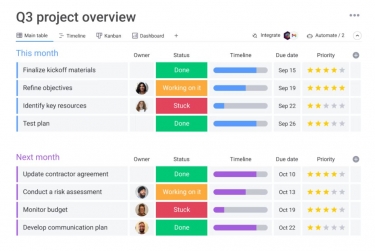The CRM is the first of five new product solutions built by monday.com to support teams in sales, marketing, software development, and project management.
Built on monday.com’s flexible low-code/no-code framework, Work OS, monday sales CRM can be implemented within minutes.
It integrates with hundreds of apps and services including Salesforce, Hubspot, Slack, Aircall, Mailchimp, PandaDoc, and Docusign, to unlock data silos and offer a holistic unified solution that automatically connects sales teams to finance, account management, legal, and customer service.
Some key features of monday sales CRM include:
Automation: Automate tedious tasks and save valuable time to close more deals faster.
|
|
Customisation: Fully customisable to suit the way your team works.
Email sync: Fully sync Gmail/Outlook to send and receive emails, or automatically log sent emails all within monday.com.
Email tracking: Get notified automatically when a lead opens or replies to an email, so that you can follow up at the right time.
Team goals: Manage team’s quota attainment over time, track wins, and view goals for specific members or the entire team.
Post sales management: Manage post-sale activities in one place to monitor client onboarding, client projects and collection tracking.
Sales operations: Plan and fast-track your sales hiring process, and equip your sales team with the tools and resources they need to close more deals
“Our new approach to CRM that is unified but also very easy to use, ensuring a seamless journey from prospect to customer and beyond, optimising daily teamwork, team satisfaction, and success,” said monday sales CRM product lead Ron Kimhi.
While monday sales CRM provides the necessary tools for sales leads and deals, the product also offers a database for the entire customer journey.
Once a deal is won, monday sales CRM immediately creates a new account for client onboarding, providing account representatives with every piece of data related to a specific account.
This workflow enables a transition from prospective customers to confirmed accounts.
Automations allow customer data to sync across departments, ensuring companies are operating efficiently and effectively with every account. It requires no dedicated administrator, and saves companies time and money, increasing revenue by as much as 30% post-implementation.





